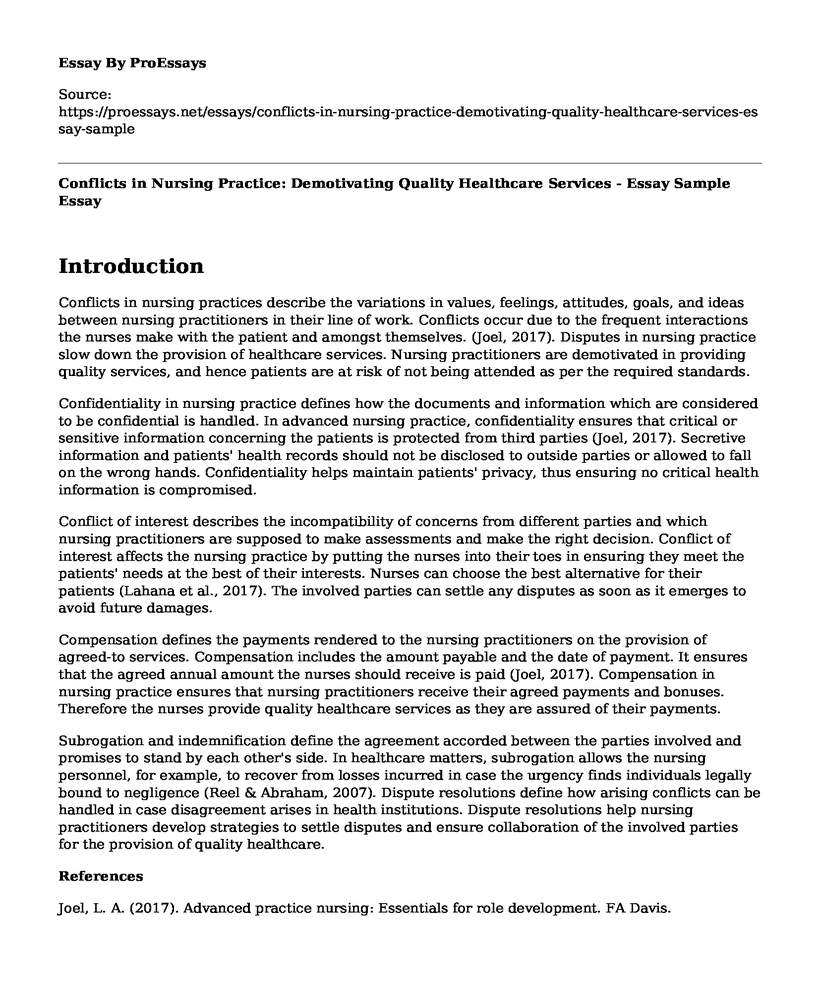Introduction
Conflicts in nursing practices describe the variations in values, feelings, attitudes, goals, and ideas between nursing practitioners in their line of work. Conflicts occur due to the frequent interactions the nurses make with the patient and amongst themselves. (Joel, 2017). Disputes in nursing practice slow down the provision of healthcare services. Nursing practitioners are demotivated in providing quality services, and hence patients are at risk of not being attended as per the required standards.
Confidentiality in nursing practice defines how the documents and information which are considered to be confidential is handled. In advanced nursing practice, confidentiality ensures that critical or sensitive information concerning the patients is protected from third parties (Joel, 2017). Secretive information and patients' health records should not be disclosed to outside parties or allowed to fall on the wrong hands. Confidentiality helps maintain patients' privacy, thus ensuring no critical health information is compromised.
Conflict of interest describes the incompatibility of concerns from different parties and which nursing practitioners are supposed to make assessments and make the right decision. Conflict of interest affects the nursing practice by putting the nurses into their toes in ensuring they meet the patients' needs at the best of their interests. Nurses can choose the best alternative for their patients (Lahana et al., 2017). The involved parties can settle any disputes as soon as it emerges to avoid future damages.
Compensation defines the payments rendered to the nursing practitioners on the provision of agreed-to services. Compensation includes the amount payable and the date of payment. It ensures that the agreed annual amount the nurses should receive is paid (Joel, 2017). Compensation in nursing practice ensures that nursing practitioners receive their agreed payments and bonuses. Therefore the nurses provide quality healthcare services as they are assured of their payments.
Subrogation and indemnification define the agreement accorded between the parties involved and promises to stand by each other's side. In healthcare matters, subrogation allows the nursing personnel, for example, to recover from losses incurred in case the urgency finds individuals legally bound to negligence (Reel & Abraham, 2007). Dispute resolutions define how arising conflicts can be handled in case disagreement arises in health institutions. Dispute resolutions help nursing practitioners develop strategies to settle disputes and ensure collaboration of the involved parties for the provision of quality healthcare.
References
Joel, L. A. (2017). Advanced practice nursing: Essentials for role development. FA Davis.
Lahana, E., Tsaras, K., Kalaitzidou, A., Galanis, P., Kaitelidou, D., & Sarafis, P. (2019). Conflicts management in public sector nursing. International Journal of Healthcare Management, 12(1), 33-39.
Reel, S. J., & Abraham, I. L. (2007). Business and Legal Essentials for Nurse Practitioners: From Negotiating Your First Job Through Owning a Practice. Elsevier Health Sciences.
Cite this page
Conflicts in Nursing Practice: Demotivating Quality Healthcare Services - Essay Sample. (2023, Mar 04). Retrieved from https://proessays.net/essays/conflicts-in-nursing-practice-demotivating-quality-healthcare-services-essay-sample
If you are the original author of this essay and no longer wish to have it published on the ProEssays website, please click below to request its removal:
- NAADAC Code of Ethics
- Essay Example: Patient Safety Risks
- Using Health Information Technology as a Source of Evidence-Based Practice
- Paper Example on Undocumented Immigration and Healthcare
- Multimodal Medium Essay: Need for Personal Fitness
- Exploring Different Theories of Employee Wellbeing - Paper Example
- Spirituality Reflective Paper Example







